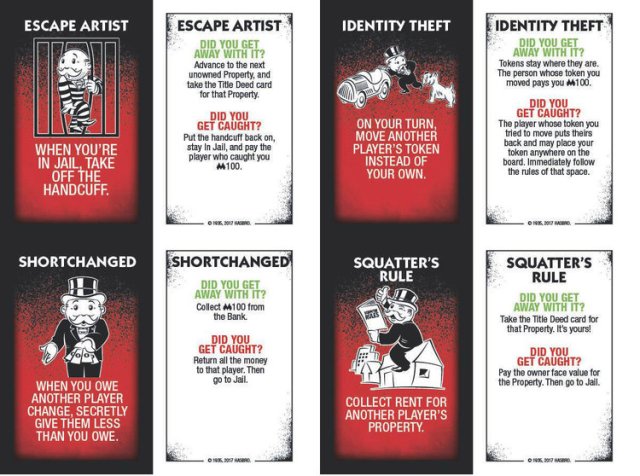
It is almost too obvious to require saying: you reinforce the behaviors you reward. Why then, would any society intentionally train its youth to be dishonest?
One justification I’ve heard, more and more frequently in recent years, is that it’s all about winning—coming out on top. The motto of these folks is “do whatever it takes to win.” Yet this is a recipe for a disastrous life. In the words of Jesus: “what does it profit a man if he gains the whole world and loses or forfeits himself?” (Luke 9:25)*
Our recreational choices say a lot about us and our values. Digital options have reduced the influence of board games, so one perennial favorite has devised a strategy to regain its market share.
Monopoly is based on accumulating wealth and, for the merciless, crushing one’s competitors. Some might argue that the capitalism which provides the basis for the game is corrupt in and of itself. Still, Monopoly has always had clear rules that governed actions.
But some players cheated. Capitalizing on this sinister impulse, Monopoly has created a new “Cheaters Edition.” Yes, you read that right.
Christian publications have announced the game’s arrival. The current issue of Citizen notes that even though cheating is actively encouraged in the game, negative consequences are also possible.
Mind you, it’s not that anything goes. Cheat successfully and you get rewarded; get caught and you get punished.
Even the “secular” Bloomberg review of the new game acknowledges the moral confusion of the product, closing its report with:
Clearly this begs some deeper philosophical questions about modern life and the future of morality and humanity, but, wait, did you just land on Boardwalk? Yes, I definitely always had a hotel on there! Trust me.
Nurturing Healthy Behaviors
One does not have to be a parent to recognize this wisdom of this Proverb: “Train up a child in the way he should go; even when he is old he will not depart from it” (Proverbs 22:6).
In fact, even pet “owners” know the necessity of training (e.g. housebreaking) our canine and feline family members.
Many games highlight positive choices, consciously or subconsciously reinforcing good. The simplest and most common method for this process comes not in a board game or a digital alternative. It is found in verbal praise.
There is ongoing debate about the value of praise. It’s clear that insincere or mechanistic praise would be of insignificant worth, and potentially dangerous. Some psychologists go so far as to state that “Positive reinforcement can undercut a child’s intrinsic motivation.”
C.S. Lewis understood that we cannot manufacture our own motivations.
I cannot, by direct moral effort, give myself new motives. After the first few steps in the Christian life we realise that everything which really needs to be done in our souls can be done only by God (Mere Christianity).
Despite this truth, it is also argued that our character can be shaped, in a sense, by consciously and repeatedly choosing to do what is right. Gradually then, by God’s grace, obedience may gradually give way to a more honest and natural motivation as the positive paths become our normal, well-traveled path.
This is not simply a “Christian” concern. The philosopher Aristotle noted “Good habits formed during youth make all the difference.” (What do you think Aristotle would think about the Cheater’s Edition of Monopoly?)
C.S. Lewis would doubtless concur with Aristotle. I assume most of Mere Inkling’s readers agree with the ancient wisdom as well.
A final thought. This cheater’s edition of Monopoly probably possesses less power to damage lives than Hasbro’s Ouijà board game. But that’s a subject for another day
* In Matthew 16 we read the more familiar “For what will it profit a man if he gains the whole world and forfeits his soul? Or what shall a man give in return for his soul?”


Interesting. I hadn’t heard of this game (but I also kind of hate Monopoly so…)
I always struggle with questions like “Will a board game/movie/book/etc. corrupt us because it has bad morals?” because, one one hand, I do think these things have influence. On the other hand (I think I saw someone on Twitter express it something like this, which I found helpful), it seems reductive/simplistic to say there’s a one-to-one relationship between playing a board game/watching a movie/reading a book and what you do or believe as a person.
I do think this particular game might work better for adults, who should be sensible enough to understand that “there are no rules” ARE the rules for this game, and only this game. Playing with a child seems more complicated because with kids you’re already working on things like “don’t cheat at games” and “winning isn’t everything” and “be a polite loser.” I can see how playing a free-for-all cheating game with children just wouldn’t end well and could undermine “don’t cheat” lessons that may not really be ingrained for them yet.
On an unrelated note, I’d probably be bad at this if it meant keeping track of who owned what property and what was built there because I do tend to just trust people and not keep mental tallies like this. I’ve had people cheat at Uno with me, for instance, because if someone says they’re putting a yellow five down, I believe them; I don’t stare at the card to check to make sure it’s not a green two!
Thanks for your thoughtful response. In light of your comment, I would say:
— I’ve outgrown monopoly too, and only enjoy playing it with grandkids.
— The tweet you mention is correct that there’s no one-to-one correlation… but there doesn’t need to be for something to be bad… what about a 1:25 ratio? It would still have a negative impact on one’s values. (Some argue “desensitization” itself is sufficiently destructive to avoid activities.)
— This would definitely be better for adults than kids.
— Yes, you are apparently the naive type who would be pummeled in this game… and, sadly, disappointed by all of the folks out in the real world who live by lying. (I’m working on a post right now about lies.)
It’s tough to teach any of the virtues–including honesty–in a world where the opposite is so frequently rewarded.
Excellent, Rob.
We made up a not dissimilar version in the 80’s: “Fractional Reserve Monopoly,” wherein the economy was flooded with extra cash we procured from a novelty store. Several noticeable effects: As all players were filthy rich, values were relatively depressed and the game became a lot less fun. Then, monetary inflation set in as, to move things along or combat boredom, players adjusted prices upwards. Finally, the whole scheme would collapse. This actually resulted in many uselessly locked outcomes although a sly banker could sometimes be counted on to “win.”
Thank the Lord the real world isn’t like that…
I had forgotten all of that until now. Thanks!
Right. We’re fortunate that the 80’s version bears no resemblance to the real world economy… It does seem though that bankers do keep getting richer and richer, no matter what the economy does… Curious.
Wow!
I see what they are doing to spice up the game, but it’s not right. There is somethibg about playing by the rules that has the ring of truth about it.
Bad idea just to make money or get attention.
Gary
They have a multitude of varieties of the game. We have one with our own hometown, which isn’t large. Then there are the versions based on cultural phenomena like Star Wars.
I agree with you, though. This edition the world could do without.
Far too many of the last 2 generations are converts to this religion .
I’m not quite sure what you mean, Carl.
Moral confusion. That’s exactly where we are today.
So utterly bewildered that we don’t even recognize anything is wrong…
It’s hard to even know how to begin. Prayer–that’s where to begin! God bless!
Precisely. Prayer is the best place to begin… and to end!
I especially appreciated the Lewis quote and the use of Proverbs 22:6. We live in a culture that marginalize’s God at best and functions more or less on an agnostic level. We should not be surprised that wisdom is disregarded and foolishness embraced.
You’re right. Western culture has been ignoring God for a number of years now. At the moment active anti-Christian sentiment seems to be on the rise. We are reaping what has been sown. However, we need to continue our efforts to spread light and hope.
Pingback: Writers, AI & C.S. Lewis – Mere Inkling Press